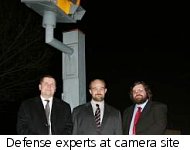1/9/2009
UK: Motorcyclist Proves Speed Camera Inaccurate in CourtMotorcyclist disproves a speed camera accusation by showing the camera disagreed with itself.

A UK motorcyclist disproved the accuracy of a speed camera in court last month by proving that the evidence that the camera produced disagreed with itself. A Brighton Magistrates Court judge agreed and found Peter Barker, 51, not guilty of the charge of driving 38 MPH in a 30 zone, despite the insistence of prosecutors that the automated ticketing machine in question was properly certified, calibrated and accurate.
Barker, a software engineer, had passed a fixed speed camera on Ditchling Road in Brighton on June 15, 2008. Some days later he received in the mail a notice claiming he had been driving 38 MPH and insisting that he pay £60 (US $90), but Barker knew he was innocent.
"The reason I contested this case is quite simply because I was not exceeding the speed limit," Barker told TheNewspaper. "I live locally to the gatsometer and pass it several times a week. On this occasion I checked my speed was 30 MPH as I approached and I confirmed it was 30 MPH just after the second flash."
Barker determined that the device was positioned toward an iron railing fence and a bus shelter that must have distorted the radar reading and created a false result. This would not be enough to prove his innocence in court, so Barker searched for the best experts in Northern Europe to evaluate the pair of photographs the machine took of him. The team included Tony Read, who headed the 1997 investigation of the Princess Diana car crash. They determined precisely how far the motorcycle could be seen moving in the images taken 0.5 seconds apart (view photo one, view photo two). They then performed a simple time-distance calculation which showed that Barker had been traveling far less than 38 MPH.
Under the UK law governing the type approval of speed cameras, anything greater than a 10 percent discrepancy between photographs and the radar reading is not allowed. Instead of accepting defeat, however, the Crown Prosecution Service decided use their own calculation of Barker's speed from the photographs to charge the motorcyclist with driving "slightly in excess of 30 MPH." The judge would not allow this, saying that the 10 percent difference proved that any evidence produced by that speed camera was "unreliable."
With "no evidence" against Barker, the judge dismissed the case. Despite this, local speed camera partnership officials insist their cameras are fully accurate and certified.
"It seems to be the first time in England that the reliability of the gatsometer was found to be questionable even thought the prosecutor and the police claimed in no uncertain terms that it was reliable," Barker said. "They refuse to believe there is any issue to concern them."


